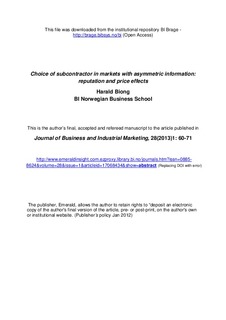Choice of subcontractor in markets with asymmetric information: reputation and price effects
Journal article, Peer reviewed
Permanent lenke
http://hdl.handle.net/11250/93730Utgivelsesdato
2013Metadata
Vis full innførselSamlinger
- Scientific articles [2181]
Originalversjon
10.1108/08858621311285723Sammendrag
Purpose -Buyers assessing bids from suppliers of experience services face both an adverse selection and a potential moral hazard problem. The purpose of this study is to examine (1) the relative importance of various signals of supplier reputation conveying information about unobserved supplier quality, which is important for identifying the best tender; and whether price is contingent on (2) supplier reputation, and (3) on buyer’s quality sensitiveness in a competitive bidding situation.
Design/methodology/approach - This study builds on a conjoint experiment where 19 contractors consider alternative scenarios representing tenders from subcontractors of plumbing services. In the scenarios the subcontractors differ on their reputation and price variables, while the contractors differ in their quality sensitiveness. Multiple regressions analyzes the contingent price effects.
Findings – Although low price is generally important for subcontractor selection, quality sensitive buyers are willing to pay subcontractors a price premium to prevent quality debasement. On the other hand, despite the combined significance of supplier reputation on choice, buyers are not willing to pay price premiums to suppliers with a quality reputation.
Research limitations/implications – Conjoint studies produce multiple cases but the underlying sample is limited. Therefore, this study should be regarded as preliminary and a basis for further validation on larger samples.
Practical implications – In competitive bidding situations, suppliers with strong quality reputations may benefit most by low price offers. Thus, suppliers with a strong reputation should achieve profitability through a volume premium rather than a price premium effect. Suppliers opting for price premiums should target the quality sensitive segment of the market.
Originality/value – In contrast to previous findings in B2B brand equity studies, but in line with findings in information economics, this study suggests that suppliers with a reputation for quality will not receive price premiums. The results indicate that in bidding contexts in B2B markets, the reputation variables may enhance rather than reduce buyers’ price sensitivity, because supplier reputation increases low price credibility.
Beskrivelse
This is the author’s final, accepted and refereed manuscript to the article
